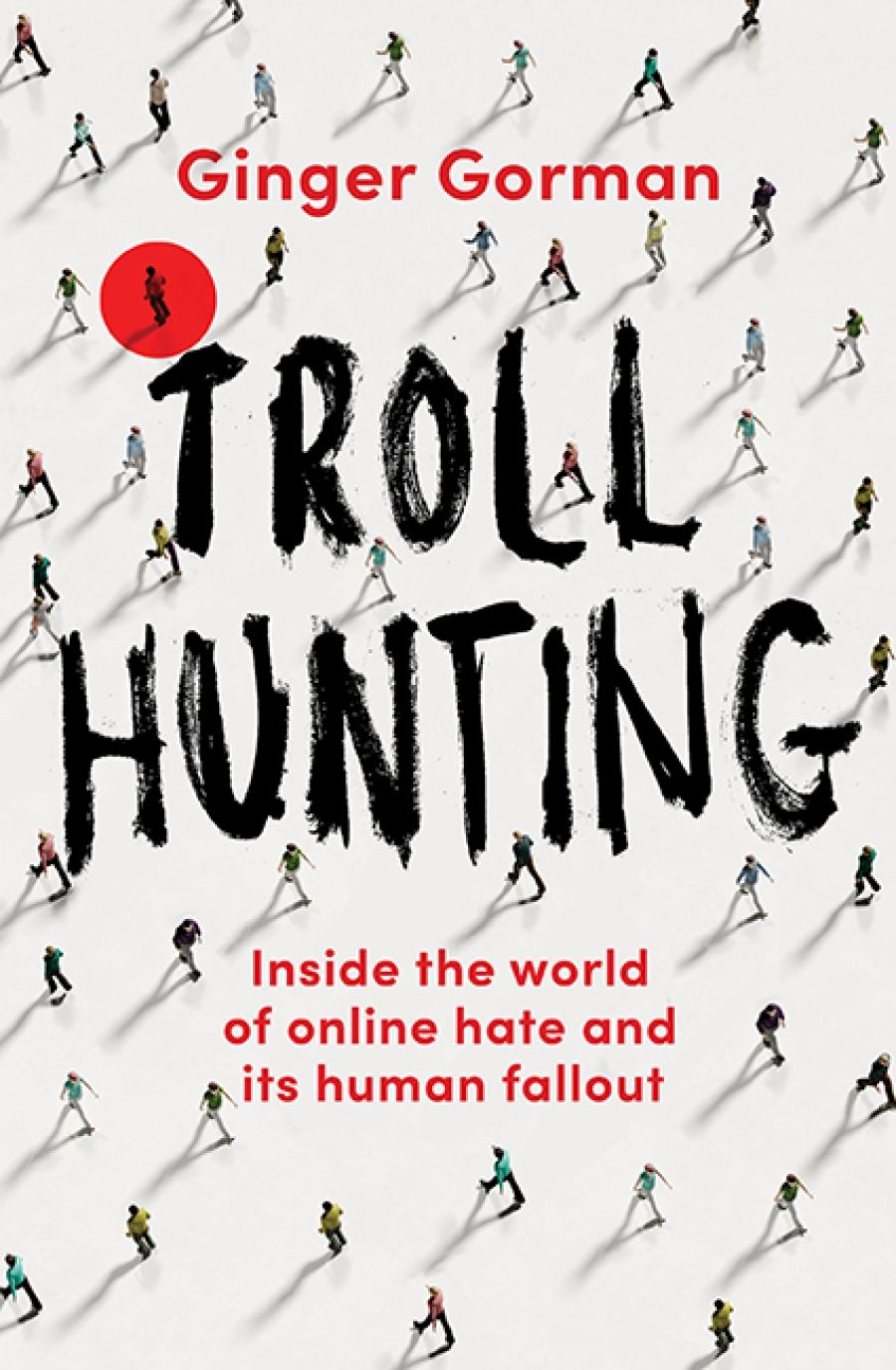
- Free Article: No
- Contents Category: Commentary
- Custom Article Title: Jacinta Mulders reviews <em>Troll Hunting</em> by Ginger Gorman
- Custom Highlight Text:
Ginger Gorman’s book-length piece of investigative journalism, Troll Hunting: Inside the world of online hate and its human fallout, arose from her experiences as a victim of cyberhate in 2013. Through her own example, and the examples of others, she shows the vulnerability of all internet users to cyberhate ...
- Book 1 Title: Troll Hunting
- Book 1 Subtitle: Inside the world of online hate and its human fallout
- Book 1 Biblio: Hardie Grant Books, $29.99 pb, 304 pp, 9781743794357
The book is best understood when viewed as a product of Gorman’s experiences as a trolling victim and her practice as a journalist. It is through this personal lens that Gorman frames her discussions with academics and other experts, her recounting of interviews with trolls, and her own experiences and speculations. The narrative style is intimate: it is stippled with authorial observations and musings, details about family life, and some sections are determinedly memoir. In one section, Gorman acknowledges the unorthodoxy of this approach to the journalistic method. Her choice seems apt in light of her subject matter and its characteristics: the trolling world is deeply personal, and its currency is emotional digs. Moreover, in a world where boundaries – between ‘real’ and online, logic and lies, politics and personality – are rendered void, her similarly borderless movement between analysis, expertise, and anecdote reflects the lawlessness of her subject matter and its emotional weight. The book feels a fitting product of Gorman’s suite of experiences in this zone.
The work is particularly strong in its elucidation of two themes bound up in trolling, both of which were key issues in public discourse in 2018. The first is misogyny. In several chapters, Gorman sets out how women are disproportionately targeted, pilloried for ‘speaking up’, and how trolling is used to harass, bully, and abuse. The analysis is not confined to the harm against female journalists and television personalities (though this is frighteningly and intensively documented), but also sets out the prevalence of online abuse in cases of domestic violence (in a cited 2015 survey of domestic violence workers, ninety-eight per cent ‘had clients who had experienced technology-facilitated stalking and abuse’).
The second is her critique of social media organisations, particularly Twitter and Facebook. As companies that create space for this behaviour on their platforms, she articulates the problems with their poor control of hate speech. One issue is to what extent corporations should be able to regulate our communications outside the remit of government oversight. Moreover, she methodically sets out the public relations jargon, elisions, and denials of responsibility that have come to characterise the responses by Facebook and Twitter to suggestions that they are not doing enough, particularly in the context of the 2018 Australian Senate committee hearings into the adequacy of existing cyberbullying laws. ‘Despite their insistence on being platforms for and champions of free speech … they are hellbent on controlling the message. The companies remain largely unwilling to be held to account.’
Gorman’s work is keen to dismantle the assumption that trolling is an ‘online’ problem; the emotional damage inflicted is very real. However, trolling is facilitated by the internet. This leads to the question as to how much, or in what ways, the qualities of the internet are responsible for these pockets of intense and arbitrary bullying we see today. Trolling commentators, Gorman included, agree that the behavioural basis of trolling sits in society and in human relationships: in our emotional wounds, in the ways we feel we are not being listened to, in parenting, in the ways we are socialised. Crucially, our communications are also shaped by the systems we use. While discussing this issue, Gorman quotes philosopher Don Ihde, who said in 1979 that ‘particular tools unavoidably select, amplify and reduce aspects of experience in various ways’. This challenge – identifying how the internet allows for the amplification of sublimated ire – would, as Gorman suggests, be a good focus for future work, in computer engineering as well as academia and criticism more broadly. Troll Hunting is evidence of the poor current integration between human emotional needs and the internet, and who bears the ultimate costs.



Comments powered by CComment